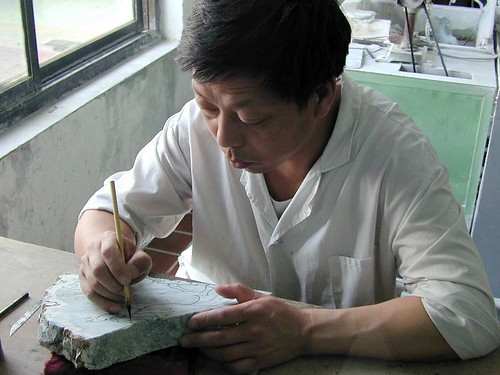
Four billion people are expected to watch the opening ceremonies of the Olympics today. But what many people may not know is that in an attempt to highlight Chinese heritage, the medals given to victorious Olympic athletes over the next several weeks will include jade—much of which is mined in terrible conditions in neighboring Burma. Although the Beijing Organizing Committee has publicly stated that the medals and officially licensed products are being made with
jade from China’s Qinghai Province, not jade from Burma,
Blood Jade: Burmese Gemstones & the Beijing Games, a new report by
8-8-08 for Burma and the
All Kachin Students and Youth Union maintains that the “showcasing of jade on the world stage will further escalate the growth in demand.
Despite being internationally and internally reviled, Burma’s ruling military junta has been able to maintain its grip on power by controlling the country’s rich natural resources. Burma exports many types of gems, all of which the junta requires be sold through government auctions, where it takes a cut of the profits. BusinessWeek reported that Burma’s official 2006 jade exports totaled $433.2 million, or 10 percent of the country’s total exports. Official tallies are often unreliable, however, and the black market further obscures the true figures.
“In the mining areas, the companies make their own laws,” says a Burmese citizen quoted in the report. Blood Jade tells of mining companies—sometimes with official military support—beating, torturing, and even killing miners who dig through mine waste for discarded stones or make mistakes on the job. “Jadeite production comes at significant costs to the human rights and environmental security of the people living in Kachin state,” says the report. “Land confiscation and forced relocation are commonplace and improper mining practices lead to frequent landslides, floods, and other environmental damage. Conditions in the mines are deplorable, with frequent accidents and base wages less than US$1 per day.”
In an attempt to keep workers on duty for longer hours and to suppress rebellion, the Burmese government has encouraged drug sales and use. The economic situation is so desperate that many women are forced into the sex trade, which the government also condones. The combination of prostitution and drug use has led to disastrous HIV/AIDS rates. “Today,” Blood Jade reports, “four prefectures in Yunnan Province are regarded as having ‘generalized HIV epidemics.’”
Yet despite the misery they cause, jade and other gems are not even the largest single source of income for Burma’s rulers. According to a 2007 article from Foreign Policy, two other resources rate higher: natural gas and the tropical hardwood teak, which is so valuable that it has “perpetuated violent conflicts among the country’s many fractious ethnic groups.”
Several groups have organized campaigns urging people not to buy jade products, but it is unclear what impact they will have on the trade. Following the junta’s crackdown on anti-government protests by Buddhist monks in November 2007, a representative of Kam Wing Cheong Jewelry in China told BusinessWeek: “We will not stop purchasing stones in Burma because of the political situation. The political chaos did not start with the junta; the country has been plagued by the conflicts with ethnic minorities for years. This is totally out of our control.”
Photo: Man working in a jade factory in China. Courtesy of Flickr user maethlin
 Four billion people are expected to watch the opening ceremonies of the Olympics today. But what many people may not know is that in an attempt to highlight Chinese heritage, the medals given to victorious Olympic athletes over the next several weeks will include jade—much of which is mined in terrible conditions in neighboring Burma. Although the Beijing Organizing Committee has publicly stated that the medals and officially licensed products are being made with jade from China’s Qinghai Province, not jade from Burma, Blood Jade: Burmese Gemstones & the Beijing Games, a new report by 8-8-08 for Burma and the All Kachin Students and Youth Union maintains that the “showcasing of jade on the world stage will further escalate the growth in demand.
Four billion people are expected to watch the opening ceremonies of the Olympics today. But what many people may not know is that in an attempt to highlight Chinese heritage, the medals given to victorious Olympic athletes over the next several weeks will include jade—much of which is mined in terrible conditions in neighboring Burma. Although the Beijing Organizing Committee has publicly stated that the medals and officially licensed products are being made with jade from China’s Qinghai Province, not jade from Burma, Blood Jade: Burmese Gemstones & the Beijing Games, a new report by 8-8-08 for Burma and the All Kachin Students and Youth Union maintains that the “showcasing of jade on the world stage will further escalate the growth in demand. A Publication of the Stimson Center.
A Publication of the Stimson Center.




